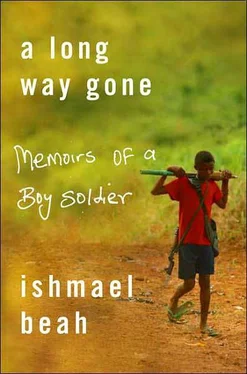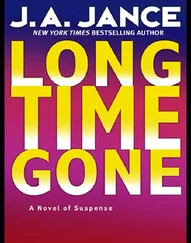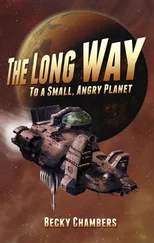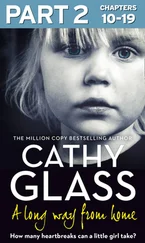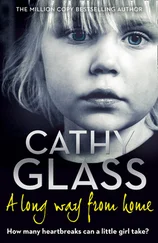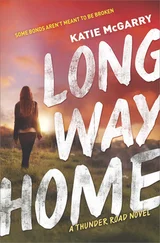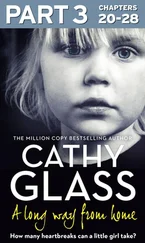At Kabati, we ate, rested a bit, and started the last six miles. Grandmother wanted us to spend the night, but we told her that we would be back the following day.
“How is that father of yours treating you these days?” she asked in a sweet voice that was laden with worry.
“Why are you going to Mattru Jong, if not for school? And why do you look so skinny?” she continued asking, but we evaded her questions. She followed us to the edge of the village and watched as we descended the hill, switching her walking stick to her left hand so that she could wave us off with her right hand, a sign of good luck.
We arrived in Mattru Jong a couple of hours later and met up with old friends, Gibrilla, Kaloko, and Khalilou. That night we went out to Bo Road, where street vendors sold food late into the night. We bought boiled groundnut and ate it as we conversed about what we were going to do the next day, made plans to see the space for the talent show and practice. We stayed in the verandah room of Khalilou’s house. The room was small and had a tiny bed, so the four of us (Gibrilla and Kaloko went back to their houses) slept in the same bed, lying across with our feet hanging. I was able to fold my feet in a little more since I was shorter and smaller than all the other boys.
The next day Junior, Talloi, and I stayed at Khalilou’s house and waited for our friends to return from school at around 2:00 p.m. But they came home early. I was cleaning my crapes and counting for Junior and Talloi, who were having a push-up competition. Gibrilla and Kaloko walked onto the verandah and joined the competition. Talloi, breathing hard and speaking slowly, asked why they were back. Gibrilla explained that the teachers had told them that the rebels had attacked Mogbwemo, our home. School had been canceled until further notice. We stopped what we were doing.
According to the teachers, the rebels had attacked the mining areas in the afternoon. The sudden outburst of gunfire had caused people to run for their lives in different directions. Fathers had come running from their workplaces, only to stand in front of their empty houses with no indication of where their families had gone. Mothers wept as they ran toward schools, rivers, and water taps to look for their children. Children ran home to look for parents who were wandering the streets in search of them. And as the gunfire intensified, people gave up looking for their loved ones and ran out of town.
“This town will be next, according to the teachers.” Gibrilla lifted himself from the cement floor. Junior, Talloi, and I took our backpacks and headed to the wharf with our friends. There, people were arriving from all over the mining area. Some we knew, but they couldn’t tell us the whereabouts of our families. They said the attack had been too sudden, too chaotic; that everyone had fled in different directions in total confusion.
For more than three hours, we stayed at the wharf, anxiously waiting and expecting either to see our families or to talk to someone who had seen them. But there was no news of them, and after a while we didn’t know any of the people who came across the river. The day seemed oddly normal. The sun peacefully sailed through the white clouds, birds sang from treetops, the trees danced to the quiet wind. I still couldn’t believe that the war had actually reached our home. It is impossible, I thought. When we left home the day before, there had been no indication the rebels were anywhere near.
“What are you going to do?” Gibrilla asked us. We were all quiet for a while, and then Talloi broke the silence. “We must go back and see if we can find our families before it is too late.”
Junior and I nodded in agreement.
Just three days earlier, I had seen my father walking slowly from work. His hard hat was under his arm and his long face was sweating from the hot afternoon sun. I was sitting on the verandah. I had not seen him for a while, as another stepmother had destroyed our relationship again. But that morning my father smiled at me as he came up the steps. He examined my face, and his lips were about to utter something, when my stepmother came out. He looked away, then at my stepmother, who pretended not to see me. They quietly went into the parlor. I held back my tears and left the verandah to meet with Junior at the junction where we waited for the lorry. We were on our way to see our mother in the next town about three miles away. When our father had paid for our school, we had seen her on weekends over the holidays when we were back home. Now that he refused to pay, we visited her every two or three days. That afternoon we met Mother at the market and walked with her as she purchased ingredients to cook for us. Her face was dull at first, but as soon as she hugged us, she brightened up. She told us that our little brother, Ibrahim, was at school and that we would go get him on our way from the market. She held our hands as we walked, and every so often she would turn around as if to see whether we were still with her.
As we walked to our little brother’s school, Mother turned to us and said, “I am sorry I do not have enough money to put you boys back in school at this point. I am working on it.” She paused and then asked, “How is your father these days?”
“He seems all right. I saw him this afternoon,” I replied. Junior didn’t say anything.
Mother looked him directly in the eyes and said, “Your father is a good man and he loves you very much. He just seems to attract the wrong stepmothers for you boys.”
When we got to the school, our little brother was in the yard playing soccer with his friends. He was eight and pretty good for his age. As soon as he saw us, he came running, throwing himself on us. He measured himself against me to see if he had gotten taller than me. Mother laughed. My little brother’s small round face glowed, and sweat formed around the creases he had on his neck, just like my mother’s. All four of us walked to Mother’s house. I held my little brother’s hand, and he told me about school and challenged me to a soccer game later in the evening. My mother was single and devoted herself to taking care of Ibrahim. She said he sometimes asked about our father. When Junior and I were away in school, she had taken Ibrahim to see him a few times, and each time she had cried when my father hugged Ibrahim, because they were both so happy to see each other. My mother seemed lost in her thoughts, smiling as she relived the moments.
Two days after that visit, we had left home. As we now stood at the wharf in Mattru Jong, I could visualize my father holding his hard hat and running back home from work, and my mother, weeping and running to my little brother’s school. A sinking feeling overtook me.
Junior, Talloi, and I jumped into a canoe and sadly waved to our friends as the canoe pulled away from the shores of Mattru Jong. As we landed on the other side of the river, more and more people were arriving in haste. We started walking, and a woman carrying her flip-flops on her head spoke without looking at us: “Too much blood has been spilled where you are going. Even the good spirits have fled from that place.” She walked past us. In the bushes along the river, the strained voices of women cried out, “ Nguwor gbor mu ma oo, ” God help us, and screamed the names of their children: “Yusufu, Jabu, Foday…” We saw children walking by themselves, shirtless, in their underwear, following the crowd. “ Nya nje oo, nya keke oo, ” my mother, my father, the children were crying. There were also dogs running, in between the crowds of people, who were still running, even though far away from harm. The dogs sniffed the air, looking for their owners. My veins tightened.
We had walked six miles and were now at Kabati, Grandmother’s village. It was deserted. All that was left were footprints in the sand leading toward the dense forest that spread out beyond the village.
Читать дальше
